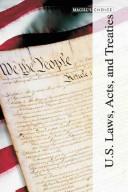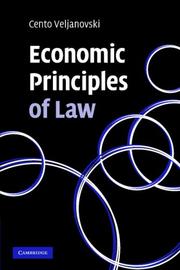| Listing 1 - 10 of 240 | << page >> |
Sort by
|
Book
ISBN: 0191666327 9780191666322 9780199644827 0199644829 Year: 2012 Publisher: Oxford
Abstract | Keywords | Export | Availability | Bookmark
 Loading...
Loading...Choose an application
- Reference Manager
- EndNote
- RefWorks (Direct export to RefWorks)
Law --- Anglo-American law --- Law, Anglo-American
Book
ISBN: 0801461111 0801460638 9780801460630 9780801447938 0801447933 9780801461118 Year: 2011 Publisher: Ithaca, NY
Abstract | Keywords | Export | Availability | Bookmark
 Loading...
Loading...Choose an application
- Reference Manager
- EndNote
- RefWorks (Direct export to RefWorks)
Problems of constitutional interpretation have many faces, but much of the contemporary discussion has focused on what has come to be called "originalism." The core of originalism is the belief that fidelity to the original understanding of the Constitution should constrain contemporary judges. As originalist thinking has evolved, it has become clear that there is a family of originalist theories, some emphasizing the intent of the framers, while others focus on the original public meaning of the constitutional text. This idea has enjoyed a modern resurgence, in good part in reaction to the assumption of more sweeping power by the judiciary, operating in the name of constitutional interpretation. Those arguing for a "living Constitution" that keeps up with a changing world and changing values have resisted originalism. This difference in legal philosophy and jurisprudence has, since the 1970's, spilled over into party politics and the partisan wrangling over court appointments from appellate courts to the Supreme Court. In Constitutional Originalism, Robert W. Bennett and Lawrence B. Solum elucidate the two sides of this debate and mediate between them in order to separate differences that are real from those that are only apparent. In a thorough exploration of the range of contemporary views on originalism, the authors articulate and defend sharply contrasting positions. Solum brings learning from the philosophy of language to his argument in favor of originalism, and Bennett highlights interpretational problems in the dispute-resolution context, describing instances in which a living Constitution is a more feasible and productive position. The book explores those contrasting positions, to be sure, but also uncovers important points of agreement for the interpretational enterprise. This provocative and absorbing book ends with a bibliographic essay that points to landmark works in the field and helps lay readers and students orient themselves within the literature of the debate.
Constitutional law --- Law --- Anglo-American law --- Law, Anglo-American
Book
ISBN: 0191018635 0191029521 9780191018633 Year: 2011 Publisher: Oxford OUP Oxford
Abstract | Keywords | Export | Availability | Bookmark
 Loading...
Loading...Choose an application
- Reference Manager
- EndNote
- RefWorks (Direct export to RefWorks)
Tom Bingham (1933-2010) was the 'greatest judge of our time' (The Guardian), a towering figure in modern British public life who championed the rule of law and human rights inside and outside the courtroom. The Business of Judging collects Bingham's most important writings during his period in judicial office before the House of Lords.The papers collected here offer Bingham's views on a wide range of issues, ranging from the ethics of judging to the role of law in a diverse society. They include his reflections on the main contours of English public and criminal law, and his early work on the
Judicial process --- Law --- Anglo-American law --- Law, Anglo-American
Book
ISBN: 9788892166974 8892166972 Year: 2017 Publisher: Torino G. Giappichelli
Abstract | Keywords | Export | Availability | Bookmark
 Loading...
Loading...Choose an application
- Reference Manager
- EndNote
- RefWorks (Direct export to RefWorks)
Common law. --- Anglo-American law --- Law, Anglo-American --- Customary law

ISBN: 1587650991 1587651009 1587652544 9781587652547 1587650983 9781587650987 9781587650994 9781587651007 1587651017 9781587651014 0587650983 Year: 2003 Publisher: Pasadena, Calif. Salem Press
Abstract | Keywords | Export | Availability | Bookmark
 Loading...
Loading...Choose an application
- Reference Manager
- EndNote
- RefWorks (Direct export to RefWorks)
A collection of 433 major U.S. acts of Congress and U.S. treaties covering the time period from 1776 through 2002, beginning with the Declaration of Independence and ending with the Homeland Security Act.
Law --- Anglo-American law --- Law, Anglo-American --- United States. --- United States --- Foreign relations
Book
ISBN: 0199709513 9780199709519 0197718507 Year: 2023 Publisher: New York ; Oxford University Press,
Abstract | Keywords | Export | Availability | Bookmark
 Loading...
Loading...Choose an application
- Reference Manager
- EndNote
- RefWorks (Direct export to RefWorks)
For over 70 years, prospective & enrolled law students have been assigned to read a text that prepares them what they are about to encounter. That text is 'The Bramble Bush'. This classic answers questions that all students have when starting law school, and virtually takes them inside the classroom.
Law --- Anglo-American law --- Law, Anglo-American --- Study and teaching --- Study and teaching (Higher)
Book
ISBN: 1107200210 1282058738 051150795X 9786612058738 0511576382 0511508611 0511505108 0511509278 0511507240 9780511508615 9780521883689 0521883687 9780511576386 9781107661240 1107661242 Year: 2009 Publisher: Cambridge New York Cambridge University Press
Abstract | Keywords | Export | Availability | Bookmark
 Loading...
Loading...Choose an application
- Reference Manager
- EndNote
- RefWorks (Direct export to RefWorks)
In recent years, there has been tremendous growth of interest in the connections between law and philosophy, but the diversity of approaches that claim to be working at the intersection of these disciplines might suggest that this area of inquiry is so fractured as to be incoherent. This volume gathers leading scholars to provide focused and straightforward articulations of the role that philosophy might play at this juncture of the history of American legal thought. It marks the seventy-fifth anniversary of Karl Llewellyn's essay 'On Philosophy in American Law' in which he rehearsed the broad development of American jurisprudence, diagnosed its contemporary failings and then charted a productive path opened by the variegated scholarship that claimed to initiate a realistic approach to law and legal theory. It is written in the spirit of Llewellyn's article: they are succinct and direct arguments about the potential for bringing law and philosophy together.
Law --- Anglo-American law --- Law, Anglo-American --- Jurisprudence --- Philosophy. --- General and Others
Book
ISBN: 9780300195071 0300195079 9780300175219 0300175213 Year: 2013 Publisher: New Haven Yale University Press
Abstract | Keywords | Export | Availability | Bookmark
 Loading...
Loading...Choose an application
- Reference Manager
- EndNote
- RefWorks (Direct export to RefWorks)
This provocative book brings together twenty-plus contributors from the fields of law, economics, and international relations to look at whether the U.S. legal system is contributing to the country's long postwar decline. The book provides a comprehensive overview of the interactions between economics and the law-in such areas as corruption, business regulation, and federalism-and explains how our system works differently from the one in most countries, with contradictory and hard to understand business regulations, tort laws that vary from state to state, and surprising judicial interpretations of clearly written contracts. This imposes far heavier litigation costs on American companies and hampers economic growth.
Law --- American essays. --- American literature --- Anglo-American law --- Law, Anglo-American --- Law -- United States..
Book
ISBN: 9064170789 Year: 1983 Volume: vol *7 Publisher: Gent
Abstract | Keywords | Export | Availability | Bookmark
 Loading...
Loading...Choose an application
- Reference Manager
- EndNote
- RefWorks (Direct export to RefWorks)
American literature --- Amerikaanse letterkunde. --- 18.06 Anglo-American literature.

ISBN: 9780521695466 9780521873741 0521695465 0521873746 0511289138 9780511289132 9780511611155 1107181305 9786612389672 0511645104 128238967X 0511649193 051128845X 0511573790 0511611153 9780511649196 9781107181304 6612389672 9780511645105 9780511573798 Year: 2007 Publisher: Cambridge New York Cambridge University Press
Abstract | Keywords | Export | Availability | Bookmark
 Loading...
Loading...Choose an application
- Reference Manager
- EndNote
- RefWorks (Direct export to RefWorks)
Economic Principles of Law, first published in 2007, applies economics to the doctrines, rules and remedies of the common law. In plain English and using non-technical analysis, it offers an introduction and exposition of the 'economic approach' to law - one of the most exciting and vibrant fields of legal scholarship and applied economics. Beginning with a brief history of the field, it sets out the basic economic concepts useful to lawyers, and applies these to assess the core areas of the common law - property, contract, tort and crime - with particular emphasis on their doctrinal structure and remedies. This is done using leading cases drawn from the birthplace of the common law (England & Wales) and other common law jurisdictions. The book serves as a primer to the wider use of economics which has become increasingly important for law students, lawyers, legislators, regulators and those concerned with our legal system generally.
Common law --- Anglo-American law --- Law, Anglo-American --- Customary law --- Economic aspects --- Economic aspects. --- Business, Economy and Management --- Economics
| Listing 1 - 10 of 240 | << page >> |
Sort by
|

 Search
Search Feedback
Feedback About UniCat
About UniCat  Help
Help News
News